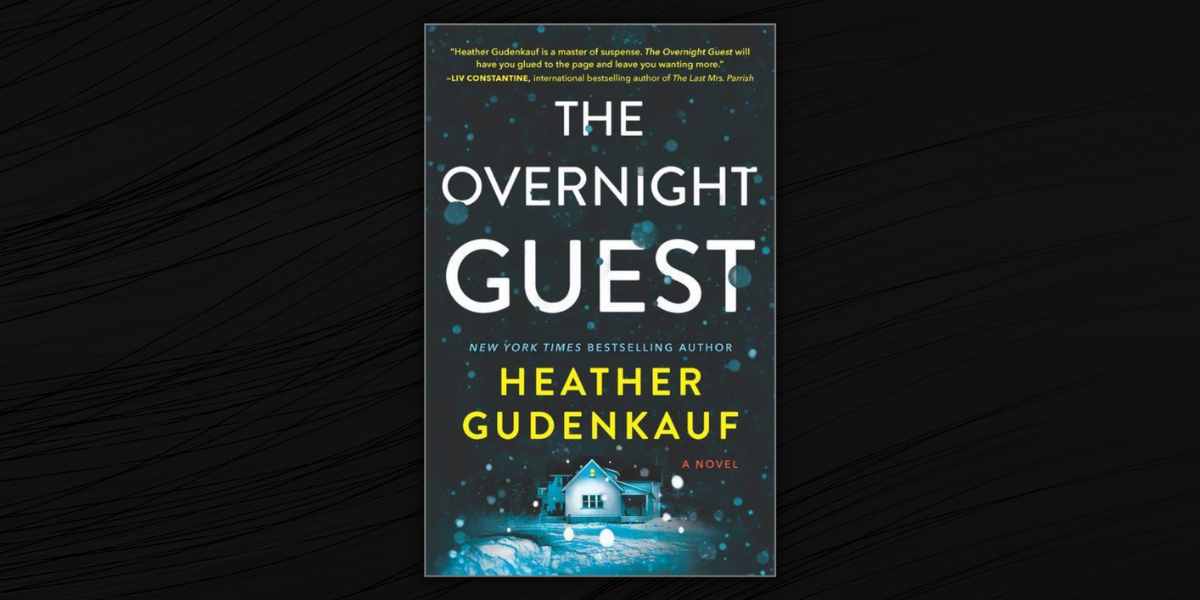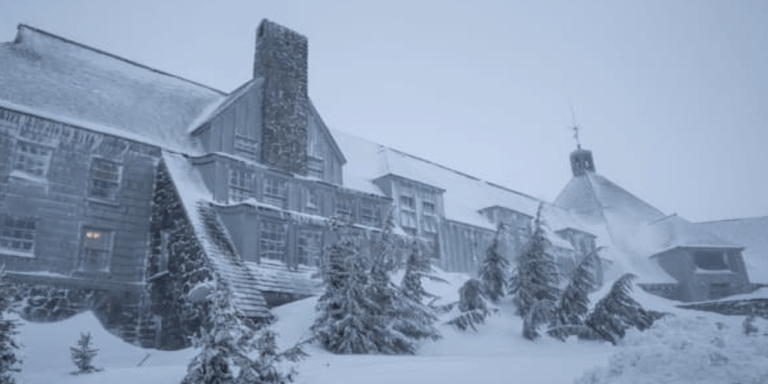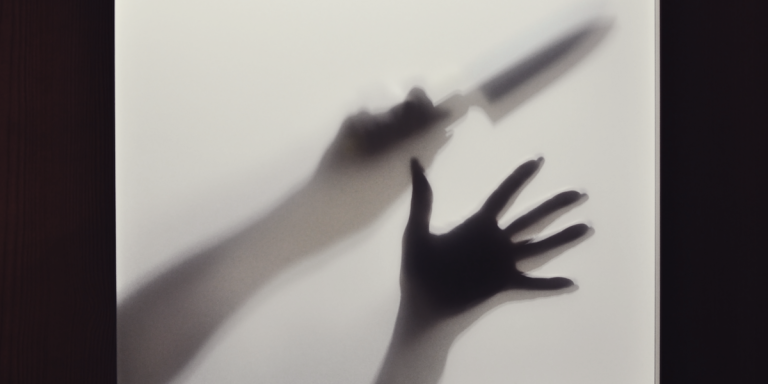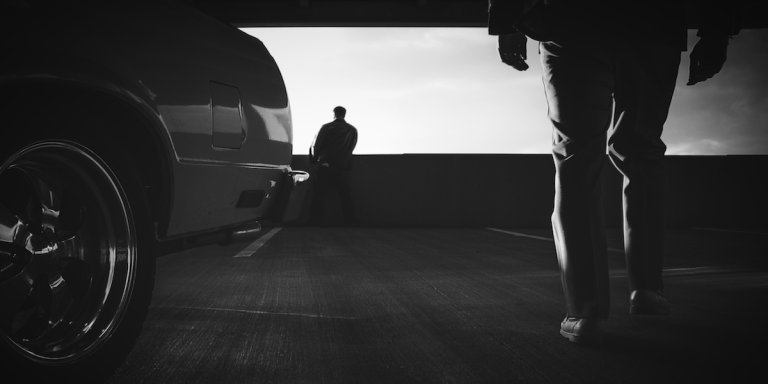Read the Excerpt: The Overnight Guest by Heather Gudenkauf
 One
One
August 2000
On August 12, 2000, Abby Morris, out of breath with sweat trickling down her temple, was hurrying down the gray ribbon of gravel road for her nightly walk. Despite her long sleeve shirt, pants, and the thick layer of bug spray, mosquitos formed a halo around her head in search of unexposed flesh. She was grateful for the light the moon provided and the company of Pepper, her black Lab. Jay, her husband, thought she was unwise to walk this time of night, but between working all day, picking up the baby at daycare and then dealing with all the chores at home, 9:30 to 10:30 was the one hour of the day that was truly her own.
Not that she was scared. Abby grew up walking roads like these. County roads covered in dusty gravel or dirt and lined with cornfields. In the three months they’d lived here, she never once encountered anyone on her evening walks, which suited her just fine.
“Roscoe, Roscoe!” came a female voice from far off in the distance. Someone calling for their dog to come home for the night, Abby thought. “Ro-sss-co,” the word was drawn out in a singsongy cadence but edged with irritation.
Pepper was panting heavily, her pink tongue thick and nearly dragging on the ground.
Abby picked up her pace. She was almost to the halfway spot in her three-mile loop. Where the gravel met a dirt road nearly swallowed up by the cornfields. She turned right and stopped short. Sitting on the side of the road, about forty yards away, was a pickup truck. A prickle of unease crept up her back and the dog looked up at Abby expectantly. Probably someone with a flat tire or engine trouble left the truck there for the time being, Abby reasoned.
She started walking again, and a feathery gauze of clouds slid across the face of the moon, plunging the sky into dark-ness, making it impossible to see if someone was sitting inside the truck. Abby cocked her head to listen for the purr of an engine idling, but all she could hear was the electric saw buzz serenade of thousands of cicadas and Pepper’s wet breathing.
“Come, Pepper,” Abby said in a low voice as she took a few steps backward. Pepper kept going, her nose close to the ground, following a zigzagging path right up to the truck’s tires. “Pepper!” Abby said sharply. “Here!”
At the intensity in Abby’s voice, Pepper’s head snapped up and she reluctantly gave up the scent and returned to Abby’s side.
Was there movement behind the darkened windshield? Abby couldn’t be sure, but she couldn’t shake the feeling that someone was watching. The clouds cleared and Abby saw a figure hunched behind the steering wheel. A man. He was wearing a cap, and in the moonlight, Abby caught a glimpse of pale skin, a slightly off-center nose, and a sharp chin. He was just sitting there.
A warm breeze sent a murmur through the fields and lifted the hair off her neck. A scratchy rustling sound came from off to her right. The hair on Pepper’s scruff stood at attention and she gave a low growl.
“Let’s go,” she said, walking backward before turning and rushing toward home.
12:05 am
Sheriff John Butler stood on the rotting back deck, looking out over his backyard, the wood shifting and creaking beneath his bare feet. The adjacent houses were all dark, the neighbors and their families fast asleep. Why would they be awake? They had a sheriff living right next door. They had nothing to worry about.
He found it difficult to catch his breath. The night air was warm and stagnant and weighed heavily in his chest. The sturgeon moon hung fat and low and bee pollen yellow. Or was it called a buck moon? The sheriff couldn’t remember.
The last seven days had been quiet. Too quiet. There were no burglaries, no serious motor vehicle accidents, no meth explosions, not one report of domestic abuse. Not that Blake County was a hotbed of lawlessness. But they did have their share of violent crimes. Just not this week. The first four days, he was grateful for the reprieve, but then it seemed downright eerie. It was odd, unsettling. For the first time in twenty years as sheriff, Butler was actually caught up on all his paperwork.
“Don’t go borrowing trouble,” came a soft voice. Janice, Butler’s wife of thirty-two years, slipped an arm around his waist and laid her head against his shoulder.
“No danger of that,” Butler said with a little laugh. “It usually finds me all on its own.”
“Then come back to bed,” Janice said and tugged on his hand.
“I’ll be right in,” Butler said. Janice crossed her arms over her chest and gave him a stern look. He held up his right hand. “Five more minutes. I promise.” Reluctantly, Janice stepped back inside.
Butler ran a calloused palm over the splintered cedar railing. The entire deck needed to be replaced. Torn down to the studs and rebuilt. Maybe tomorrow he’d go to Lowe’s over in Sioux City. If things continued as they were, he’d have plenty of time to rebuild the deck. Stifling a yawn, he went back inside, flipped the deadbolt, and trudged down the hall toward his bed and Janice. Another quiet night, the sheriff thought, might as well enjoy it while it lasts.
12:30 am
The sound of balloons popping pulled Deb Cutter from a deep sleep. Another pop, then another. Maybe kids playing with firecrackers leftover from the Fourth of July. “Randy,” she murmured. There was no answer.
Deb reached for her husband, but the bed next to her was empty, the bedcovers still undisturbed and cool to the touch. She slipped from beneath the sheets, went to the window, and pulled the curtain aside. Randy’s truck wasn’t parked in its usual spot next to the milking shed. Brock’s was gone too. She glanced at the clock. After midnight.
Her seventeen-year-old son had become a stranger to her. Her sweet boy had always had a wild streak, which had turned mean. He’d be up to no good, she was sure of that. Brock was born when they were barely eighteen and barely knew how to take care of themselves, let alone an infant.
Deb knew that Randy was hard on Brock. Too hard at times. When he was little, it took just a stern look and a swat to get Brock back in line, but those days were long gone. The only thing that seemed to get his attention now was a smack upside the head. Deb had to admit that over the years, Randy had crossed a line or two—doling out bruises, busted lips, bloody noses. But afterward, Randy always justified his harshness—life wasn’t easy, and as soon as Brock figured that out, the better.
And Randy. He’d been so distant, so busy lately. Not only was Randy helping his parents out on their farm, but he was also in the process of refurbishing another old farmhouse with half a dozen decrepit outbuildings, a hog confine, and trying to tend to his own crops. She barely saw him during the daylight hours.
Deb tried to tamper down the resentment, but it curdled in her throat. Obsessed. That was what Randy was. Obsessed with fixing up that old homestead, obsessed with the land. It was always about the land. The economy was probably going to tank, and they’d end up on the hook for two properties they couldn’t afford. She wasn’t going to be able to take it much longer.
One more bang reverberated in the distance. Damn kids, she thought. Wide awake, she stared up at the ceiling fan that turned lazily above her and waited for her husband and son to come home.
1:10 am
At first, twelve-year-old Josie Doyle and her best friend, Becky Allen, ran toward the loud bangs. It only made sense to go to the house—that’s where her mother and father and Ethan were. They would be safe. But by the time Josie and Becky discovered their mistake, it was too late.
They turned away from the sound and, hand in hand, ran through the dark farmyard toward the cornfield—its stalks, a tall, spindly forest, their only portal to safety.
Josie was sure she heard the pounding of footsteps behind them, and she turned to see what was hunting them. There was nothing, no one—just the house bathed in nighttime shadows.
“Hurry,” Josie gasped, tugging on Becky’s hand and urging her forward. Breathing heavily, they ran. They were almost there. Becky stumbled. Crying out, her hand slipped from Josie’s. Her legs buckled, and she fell to her knees.
“Get up, get up,” Josie begged, pulling on Becky’s arm. “Please.” Once again, she dared to look behind her. A shard of moonlight briefly revealed a shape stepping out from behind the barn. In horror, Josie watched as the figure raised his hands and took aim. She dropped Becky’s arm, turned, and ran. Just a little bit farther—she was almost there.
Josie crossed into the cornfield just as another shot rang out. Searing pain ripped through her arm, stripping her breath from her lungs. Josie didn’t pause, didn’t slow down, and with hot blood dripping onto the hard packed soil, Josie kept running.
Two
Present Day
Because of how quickly the storm was approaching, Wylie Lark angled into the last open parking spot on the street where Shaffer’s Grocery Store was tucked between the pharmacy and the Elk’s Lodge. Wylie would have preferred to have driven to the larger, better-stocked grocery store in Algona, but already heavy gray snow clouds descended on Burden.
Wylie stepped from her Bronco, her boots crunching against the ice salt spread thickly across the sidewalk in anticipation of the sleet and two feet of snow expected that evening.
With trepidation, Wylie approached the store’s glass windows, decorated for Valentine’s Day. Shabby red and pink hearts and bow-and-arrow-clad cupids. She paused before yanking open the door. Shaffer’s was family owned, carried off brands, and had a limited selection. It was convenient but crowded with nosy townspeople.
So far, whenever Wylie made the drive into Burden, she had successfully dodged interactions with the locals, but the longer she stayed, the more difficult it became.
Once inside, she was met with a blast of warm air. She resisted the temptation to remove her stocking hat and gloves and instead inserted her earbuds and turned up the volume on the true crime podcast she had been listening to.
All the carts were taken, so Wylie snagged a handbasket and began walking the aisles, eyes fixed firmly on the ground in front of her. She started tossing items into her basket. A frozen pizza, cans of soup, tubes of chocolate chip cookie dough. She paused at the wine shelf and scanned the limited options. A man in brown coveralls and green and yellow seed cap bumped into her, knocking an earbud from her ear.
“Oops, sorry,” he said, smiling down at her.
“It’s okay,” Wylie responded, not looking him in the eye. She quickly grabbed the nearest bottle of wine and made her way to join the long line of people waiting to check out.
The sole cashier’s brown hair was shot through with gray and was pulled back from her weary face by a silver barrette. She seemed oblivious to the antsy customers eager to get home. She slid each item across the scanner at an excruciatingly slow pace.
The line inched forward. Wylie felt the solid form of someone standing directly behind her. She turned. It was the man from the wine aisle. Sweating beneath her coat, Wylie looked toward the cashier. Their eyes met.
“Excuse me,” Wylie said, muscling her way past the man and the other shoppers. She set her basket on the floor and rushed out the doors. The cold air felt good on her face.
Her cell phone vibrated in her pocket and she fished it out. It was her ex-husband and Wylie didn’t want to talk to her him. He would go on and on about how she needed to get back to Oregon and help take care of their son, that she could just as easily finish her book at home. She let the call go to voice mail.
He was wrong. Wylie wouldn’t be able to finish the book back home. The slammed doors and shouting matches with fourteen-year-old Seth over his coming home too late or not coming home at all frustrated her to no end. She couldn’t think, couldn’t concentrate there. And when Seth, glowering at her from beneath his shaggy mop of hair, told her he hated her and wanted to go live with his dad, she’d called his bluff.
“Fine. Go,” she said, turning away from him. And he did. When Seth didn’t come home the next morning or answer any of her calls and texts, Wylie packed her bags and left. She knew it was the easy way out, but she couldn’t handle Seth’s secrecy and anger a second longer. Her ex could deal with it for a few days. Except the days turned into weeks and then months.
She moved to shove the phone back into her pocket, but it tumbled from her fingers and struck the concrete and bounced into a slush-filled rut.
“Dammit,” Wylie said, bending over to fish the phone from the icy puddle. The screen was shattered, and the phone was soaked through.
Once in her vehicle, Wylie ripped off her hat and shrugged out of her coat. Her hair and T-shirt were damp with sweat. She tried to wipe the moisture from the phone but knew that unless she got home in a hurry and dried it out, it was ruined. She futilely poked at the cracked screen, hoping that it would light up. Nothing.
The twenty-five-minute drive back to the farmhouse seemed to take forever and she had nothing to show for it. No groceries, no wine. She’d have to make do with what she had back at the house.
Though it took Wylie only two minutes to put Burden in her rearview mirror, what laid before her felt like an endless stripe of black highway. Twice she got stuck behind salt trucks, but the farther north she traveled, the fewer cars she saw. Everyone was hunkered in, waiting for the storm to hit. Finally, she turned off the main road and bounced across the poorly maintained gravel roads that would lead her to the house.
Wylie had been staying in rural Blake County for six weeks, and the weather had been brutal. The cold went bone-deep and she couldn’t remember seeing so much snow. As she drove, she passed fewer and fewer houses and farms until all she could see was a sea of white where corn and soybeans and alfalfa once stood. They gave no suggestion of the explosion of green and gold that was sure to come in a few months.
Wylie drove another several miles and slowed to a crawl to inch around the hickory tree that inexplicably grew in the middle of where two gravel roads intersected and then over the small pony trestle bridge that spanned the frozen creek below.
Two hundred yards beyond the bridge, the long, narrow lane, lined with shoulder high, snow-packed drifts, would take her to the house. She drove past the line of tall pines that served as a windbreak and toward the red-weathered barn, now covered in white. She left the Bronco idling while she pulled open the wide doors of the barn, which she used as a garage, drove inside, turned off the ignition, and shoved the keys in her pocket. She closed the wide wooden doors behind her and looked around at the open prairie.
The only sound was the rising wind. Wylie was alone. There was no other human being for miles. This was precisely what she wanted.
Icy sleet fell from the sky. The storm was here.
Wylie slid the damaged phone into her pocket and headed for the farmhouse.
Once inside, she locked the back door, kicked off her boots, and replaced them with fleece-lined moccasins. Wylie rushed to the cupboards in search of a box of rice so she could dry out her phone. There was none. She would have to get it fixed or buy a new one. Wylie hung her winter parka on a hook in the mudroom but left her stocking cap atop her head.
The farmhouse was a hundred years old and was as creaky and contrary as an old man. The furnace chugged along but couldn’t keep up with the cold air that snuck between the windowpanes and beneath the doors. Wylie had meant to stay for only a week, two at the most, but the longer she stayed, the harder it was to leave.
At first, she blamed her ex-husband, and the prickly patch she had hit with Seth. She was so weary of arguing with them. She needed to focus and finish her current book.
So she made a phone call, discovered that the remote farmhouse where the twenty-year-old crime took place was currently unoccupied, and decided to make the trip. The house had only the basics—electricity and water. No Wi-Fi, no television, no teenage son to remind her what a bad mother she was. She’d be fifteen hundred miles away from any distractions. Now that she’d dropped and destroyed her phone, her only connection to the world was the landline. Her access to the internet, text, FaceTime was all gone.
She was working on her fourth true crime book and often traveled for research, but she had never been gone from home for so long. The longer Wylie stayed in Burden, she realized there was more to it, or she would have finished the book by now and been back home.
Tas, a geriatric coonhound mix, looked languidly up from his bed next to the radiator with his yellow eyes. Wylie ignored him. Tas yawned and lowered his long snout to his paws and closed his eyes.
Sunset was three hours away, but the storm cast a gray pall through the windows. Wylie went through the house, flipping on lights. She hauled the last of the cut wood from the mudroom, set it by the fireplace, and built a fire. She hoped the kindling would last through the night; she didn’t relish the thought of having to go out to the barn to bring in more.
Outside, the sleet was picking up momentum, slashing at the windows and covering the naked tree limbs in an icy glaze. It would be pretty if Wylie wasn’t already so tired of winter. The groundhog had seen his shadow, more snow was coming, and spring seemed far away.
Wylie began her routine just as she had every afternoon for the last six weeks. She went around the house, double-checking that the windows and doors were locked, and closed the shades. Wylie might have preferred to be alone, spent her life writing about horrifying crimes, but she didn’t like the dark and what might be lurking outside after the sun went down. She opened the drawer of her bedside table to make sure that her 9 mm handgun was still there.
She showered quickly, hoping to beat the moment when the hot water turned tepid, and towel dried her hair. She pulled on long underwear, wool socks, jeans, and a sweater and went back down to the kitchen.
There Wylie poured herself a glass of wine and sat on the sofa. Tas tried to heave himself up next to her. “Down,” she said absentmindedly, and Tas returned to his spot next to the radiator.
Wylie thought about using the landline to call Seth, but she ran into the chance that her ex would be nearby and insist on speaking with her. She’d heard it all before.
Inevitably, their conversation would collapse beneath a bevy of harsh words and accusations. “Come home. You’re acting unreasonable,” her ex-husband said during one of their last phone calls. “You need help, Wylie.”
She had felt something crack inside her chest. Just a small fissure, just enough to let her know that she needed to get off the phone. She hadn’t talked to Seth in over a week.
Wylie carried her glass up the steps and sat down at the desk in the room she was using as her office. Tas followed be-hind and laid down beneath the window. The room was the smallest of the bedrooms, yellow with Major League Baseball stickers lining the baseboards. Her desk sat in the corner facing outward so she could see both the window and the door.
The manuscript she printed the week before at the library in Algona sat in a stack next to her computer, ready for one final read through. But still, Wylie was hesitant to bring the project to a close.
She had spent over a year studying crime scene photos, reading through newspaper articles and official reports. She contacted witnesses and individuals key to the investigation including deputies and the former sheriff. Even the lead agent from the Iowa Department of Criminal Investigation agreed to talk to her. They were surprisingly candid and gave Wylie little-known insights into the case.
Only the family members wouldn’t speak to her. Either they had died or flat out refused. She couldn’t really blame them. Wylie spent endless hours writing, her fingers flying across the keyboard. Now the book was finished. Had its resolution, as meager as it was. The murderer had been identified but not brought to justice.
Wylie still had so many unanswered questions, but now it was time. She needed to read through the pages, make any final revisions, and send the manuscript to her editor.
Wylie tossed her red pen on the desk in frustration. She stood and stretched and made her way downstairs to the kitchen and set her empty wine glass on the counter. Her hands ached with cold, but she was determined not to turn up the thermostat. Instead, she filled the tea kettle with water and set it on the stove. While it heated, she hovered her hands over the burner.
Outside, the wind whipped and cried mournfully, and after a few minutes, the tea kettle joined in with its own howl. Wylie took her cup of tea back to the desk and sat down again. She set aside the manuscript and her thoughts turned to the next project she might take on.
There was no shortage of grisly murders. Wylie had plenty to choose from. Many true crime writers chose their subject matter based on headlines and public interest in the crime. Not Wylie. She always began with the crime scene. This was where the story snaked into her veins, and she wouldn’t let go.
She would pore over photos taken at the crime sites—im-ages of the locations where the victims took their final breaths, the position of the bodies, the faces frozen in death, the frenzy of blood splatter.
The photos she was reviewing now were from a crime scene in Arizona. The first picture was taken from a distance. A woman was sitting propped up against a rust-colored rock, tufts of dusty scrub brush surrounded her like a wreath, her face tilted away from the camera. A black stain darkened the front of her shirt.
Wylie set aside the photo and looked at the next one in the pile. The same woman but up close and from a different angle.
Wylie still had so many unanswered questions, but now it was time. She needed to read through the pages, make any final revisions, and send the manuscript to her editor.
Wylie tossed her red pen on the desk in frustration. She stood and stretched and made her way downstairs to the kitchen and set her empty wine glass on the counter. Her hands ached with cold, but she was determined not to turn up the thermostat. Instead, she filled the tea kettle with water and set it on the stove. While it heated, she hovered her hands over the burner.
Outside, the wind whipped and cried mournfully, and after a few minutes, the tea kettle joined in with its own howl. Wylie took her cup of tea back to the desk and sat down again. She set aside the manuscript and her thoughts turned to the next project she might take on.
There was no shortage of grisly murders. Wylie had plenty to choose from. Many true crime writers chose their subject matter based on headlines and public interest in the crime. Not Wylie. She always began with the crime scene. This was where the story snaked into her veins, and she wouldn’t let go.
She would pore over photos taken at the crime sites—im-ages of the locations where the victims took their final breaths, the position of the bodies, the faces frozen in death, the frenzy of blood splatter.
The photos she was reviewing now were from a crime scene in Arizona. The first picture was taken from a distance. A woman was sitting propped up against a rust-colored rock, tufts of dusty scrub brush surrounded her like a wreath, her face tilted away from the camera. A black stain darkened the front of her shirt.
Wylie set aside the photo and looked at the next one in the pile. The same woman but up close and from a different angle. The woman’s mouth was contorted into a pained grimace. Her tongue poked out black and bloated. Carved into her chest was a hole big enough for Wylie to stick her hand into, surrounded by a ragged fringe of skin, revealing bone and gristle.
The pictures were gory, disturbing, and the stuff of nightmares, but Wylie believed that she needed to get to know the victims in death first.
At 10:00 p.m., Tas nudged her leg. Together they went down the steps; Tas moved more slowly, his joints clicking rustily. It wouldn’t be long, and Tas would no longer be able to manage the stairs.
She wondered what her ex-husband would say when Wiley told him she picked up an old stray she found sitting outside the farmhouse’s front door. No matter how much she tried to get him to leave, the dog stuck around.
Wylie figured he was left behind by the people who had rented the place before she arrived. She named him Tas, short for Itasca, the state park where three young women’s bodies were discovered and who were the subjects of Wylie’s first true crime book.
Wylie didn’t like Tas much, and the feeling was mutual. They seemed to have come to the understanding that they would have to coexist for the time being.
She unlocked the front door, opening it just enough to let Tas out, and shut it behind him. Still, cold air, snow, and sleet found their way into the house, and Wylie shivered.
One minute passed, then two. Tas, not fond of the cold, was normally quick about doing his business and would scratch at the door to signal that he was ready to come back inside.
Wylie went to the window, but the panes were fogged over and lacquered with ice. She rubbed her eyes, gritty from staring too long at the grainy photos, and leaned her back against the door to wait. She wouldn’t be able to sleep until the sun rose.
The lights flickered, and Wylie’s heart flipped in panic. She stared at the lamp and held her breath, but the warm glow remained steady. She added more wood to the fire. If the power went out, the pipes could freeze, and she would have a real mess on her hands. Wylie opened the door a crack and peered out into a sea of white, but there was no Tas.
“Tas!” she called out into the dark. “Here!” The rain had transformed into hard pellets that hit the house with an incessant rodent-like scritch-scratch. Wylie couldn’t see past the weak light that spilled from above the door. “Great,” she muttered as she reached into the front closet for a spare set of boots, an old barn coat, and one of the many flashlights she kept stowed around the house.
Once bundled up, she stepped outside, careful not to slip on the steps leading from the porch to the front yard.
“Tas!” she called again in irritation. She hunched her shoulders to the biting wind and ducked her head to combat the sting from the tiny beads of ice striking her face.
Several inches of snow had already fallen, and now of all things, it was sleeting, transforming the yard into an ice rink.
Another flash of uneasiness went through Wylie. Heavy ice or snow on the power lines was sure to lead to their collapse and an outage and complete darkness. She wanted to find Tas and get inside.
Using the porch rail to steady herself and the beam from the flashlight to guide her, Wylie eased along, calling out to him. She squinted through the dark and aimed the flashlight toward the lane that led to the road. Two eerie red orbs flashed back at her. “Tas, you come here,” she ordered. He lowered his head, ignoring her commands.
In resignation, Wylie began the trek toward the stubborn dog. She bent slightly forward and moved, flat-footed, trying to keep her center of gravity directly over her feet. Still, she slipped, landing with a thud on her tailbone.
“Dammit,” she snapped as she got to her feet again. The sleet had worked its way into the gap between her coat and her neck. Her hands were bare, and she longed to shove them in her pockets but didn’t dare. She needed them out, extended, in case she fell again.
Tas stayed put. As Wylie got closer, she saw that Tas’s attention was squarely focused on something on the ground in front of him. Wylie couldn’t tell what it was. Tas circled around the object, sniffing at it tentatively.
“Get away from there,” Wylie commanded. As she shuffled forward, she could see that it was not an object but a living or once-living creature. It was curled in a tight ball and covered in a sheath of ice that glistened in the light from the flashlight.
“Tas, sit!” she shouted. This time, Tas lifted his head to look at her, then obediently sat back on his haunches. Wylie crept closer; her eyes followed the coil of the body. A scuffed shoe, the faded blue of denim, the downy gray of a sweatshirt, a shorn head of dark hair, a small fist pressed to pale lips. A thin, frozen river of blood branched out around its head.
What lay before them was no animal. It was a little boy, frozen to the ground.
Excerpted from The Overnight Guest by Heather Gudenkauf. Copyright © 2021 Heather Gudenkauf. Published by arrangement with Harlequin Books S.A.
Order the Book
She thought she was alone…
True crime writer Wylie Lark doesn’t mind being snowed in at the isolated farmhouse where she’s retreated to write her new book. A cozy fire, complete silence. It would be perfect, if not for the fact that decades earlier, at this very house, two people were murdered in cold blood and a girl disappeared without a trace.
As the storm worsens, Wylie finds herself trapped inside the house, haunted by the secrets contained within its walls—haunted by secrets of her own. Then she discovers a small child in the snow just outside. After bringing the child inside for warmth and safety, she begins to search for answers. But soon it becomes clear that the farmhouse isn’t as isolated as she thought, and someone is willing to do anything to find them.
By clicking 'Sign Up,' I acknowledge that I have read and agree to Hachette Book Group’s Privacy Policy and Terms of Use





